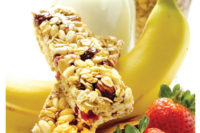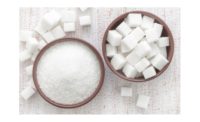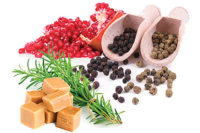It’s no secret that shoppers are stocking their carts with an eye to health when it comes to snacks and baked goods. But ask 100 consumers what they’re looking for in a healthy product, and you might get just as many answers.
So when FDA announced proposed food labeling changes earlier this year that would break out added sugars—those added during the production process, as opposed to those existing naturally in foods—from the more general “sugars” listing, the next target seemed obvious.
According to FDA, 16% of Americans’ total daily calories come from added sugars in soda, energy and sports drinks, desserts, fruit drinks and candy, as well as lesser-known offenders like cereals and sweetened yogurt. And this, they say, is a problem. When consumers fill up on added sugars, they’re not only getting empty calories, they’re also missing out on nutrients they could be getting from healthier foods.
But are shoppers really concerned about added sugar and high-fructose corn syrup, another much-cited health foe? A new research study called “The Sweetener360,” completed, in part, by Nielsen and Mintel, and commissioned by the Corn Refiners Association (CRA), found that the answer is no. Consumers aren’t yet putting their money where their mouth is. Researchers surveyed and studied more than 11,000 consumers and found that while more than half of them say they are actively pursuing a healthy lifestyle and avoiding sugars, their purchase decisions tell a different story.
“Ongoing research conducted by Mintel shows that consumers are more concerned about total sugars than specific types,”
explains Martin Concannon, founder, Lafayette Associates, Salem, MA. “‘The Sweetener360’ shows that 67% of consumers agree that to be healthy, moderation is more important than specific sweetener ingredients, including high-fructose corn syrup.”
This is a matter of putting the question into context. “Obesity and diabetes are key drivers for consumers seeking alternatives to sugar and corn syrups, but not drivers moving consumers away from sweet foods,” says Mel Mann, director of flavor innovation, Wixon Inc., St. Francis, WI. “As usual, consumer statements about their buying behavior (buying fewer sweet foods) and their actual behavior (increasing sales of sweet foods) are not always in sync.”
A varied landscape
The landscape for sweeteners has never been more robust, as suppliers rush to offer a variety of ingredients to suit consumers’ and food processors’ demands. “Sweeteners always play an important role in most everyone’s diet for many reasons and, as such, the sweetener market is strong and stable,” says Joseph Hickenbottom, vice president of sales and marketing, Malt Products Corp., Saddle Brook, NJ. “The choice of sweeteners depends on the product in which it is to be used.”
According to Carlos Rionda, vice president of sales and marketing, Zucarmex USA, Tucson, AZ, many consumers are looking for unrefined, unbleached sugars produced from natural sources, like pure cane sugar. The company’s Zulka Powdered Pure Cane Sugar is “pulverized into ultrafine crystals,” he says, and mixed with Non-GMO Project Verified cornstarch for a fine consistency that’s suitable for icings, meringues, decorating or recipes where traditional powdered sugar is used. Zulka Brown Pure Cane Sugar is blended with molasses to deliver a full-bodied flavor and aroma, making it ideal for baking.
Along with pure cane sugar, honey is another back-to-basics staple making a comeback. “An all-natural sweetener such as honey is perfect for the baking and snack industries because the ingredient contributes both flavor and functional values in a formula,” says Catherine Barry, director of marketing, National Honey Board, Firestone, CO.
According to Barry, honey is a recognizable ingredient that also can give manufacturers a clean label that consumers will understand. On the formulating side, it can enhance the flavors of other ingredients. “Naturally occurring acids in honey, such as gluconic acid, enhance the flavors of spices, fruits and nuts,” she explains. “When used with cinnamon, herbs, spices or other flavors, honey helps bring out those tastes and aromas.”
This approach is decidedly retro. “I think most innovation will come from pulling back to the basics, coupled with creative utilization of sweeteners that consumers will understand,” says Shawn Kohlmeier, product manager, Briess Malt & Ingredients Co., Chilton, WI.
But as a premium product, honey is not always an option financially for bakers and snack producers, and in such cases, ingredient suppliers are stepping up to offer alternatives. Briess recently launched BriesSweet White Sorghum Syrup, which can be used as a honey replacement. “We have noticed that when replacing honey or a percentage of honey in items such as breads, BriesSweet White Sorghum Syrup actually improves flavor and helps mask the bitter flavor of whole-grain breads,” says Kohlmeier. “The kicker is that sorghum grain syrup is much more economical in applications than honey.”
Beet sugar, another natural alternative, boasts a similar mouthfeel to sucrose and can be used in tandem with high-intensity sweeteners without the aftertaste. BENEO Inc., Morris Plains, NJ, offers manufacturers Palatinose, which is derived from sugar beets. “Through an enzymatic linkage, it becomes a slowly digestible carb that provides energy sustenance over a longer period of time,” explains Joe O’Neill, president and general manager at the company.
The company also offers Orafti, a range of highly soluble inulin prebiotic fiber ingredients. Orafti oligofructose, a natural sugar replacer, provides all the nutritious benefits of fiber, according to O’Neill.
Exotic offerings in the sweeteners category are experiencing success, too. Conscious Food Ltd., London, recently launched SugaVida, sugar from the sap of the palmyra palm tree. It carries a low glycemic index and is both an organic natural sweetener and a superfood, says CEO and founder Kristina Locke.
“You use half the amount of sugar in cooking and baking, it tastes delicious with no chemical or bitter aftertaste associated with artificial sweeteners and stevia, and it is the only bioavailable, plant-based source of vitamin B12 found in nature,” she explains, adding the company has seen a demand from chocolate, bread, gluten-free, muffin and snack manufacturers.
Stevia in the spotlight
“Traditionally, some of the older stevia products left a lingering sweetness,” says Steve Pearce, CEO, Omega Ingredients LLC, Ipswich, England, and chief creative officer, Maverick Innovations, Hillsborough, NC, referencing a common complaint among consumers and formulators alike. He notes that the new generation of stevia products has a high degree of purity and is carefully refined “to give a clean, sweet taste that doesn’t need masking.” He cites a new product on the market, RightSweet EPCevia Convenient, a stevia-based sweetener combined with bulking products that can replace sugar on a gram-for-gram basis.
Cargill, Minneapolis, launched ViaTech, a line of stevia-based sweeteners, in March. “Part of what sets the ViaTech portfolio apart from other stevia-based sweeteners is Cargill’s proprietary taste-prediction model, which can precisely predict which combination of steviol glycosides deliver optimal taste and sweetness,” explains Pam Stauffer, global marketing programs manager for the company.
Still, when a formulator wants to get it just right, there are several ingredients on the market designed specifically to work with stevia. Wixon, for instance, offers a flavor modifier in its Mag-nifique line for use with stevia sweeteners. “Using it means manufacturers won’t have to use as much stevia to achieve the same level of sweetness,” explains Mann.
Custom formulations
Custom formulations remain popular in the sweetener category. “We have found that our customers in the snack food and sweet baked goods category are looking for plug-in replacements for sugar,” says Thom King, president, Steviva Ingredients, Portland, OR. “With a plug-in replacement, which is generally a combination of bulking sweeteners and natural high-intensity sweeteners, manufacturers can have one drop-in solution. The result is consistency.”
Steviva Ingredients recently launched Nectevia, a plug-in replacement for DE 42 high-fructose corn syrup, as well as Steviva Blend in a 100-mesh powder form as a plug-in for confectionary sugar.
Ingredion Inc., Westchester, IL, offers non-GMO versions of glucose, dextrose, maltodextrin, high-fructose corn syrup, sorbitol, high-maltose syrup, stevia and more. The sweeteners category overall is expected to grow with a compound annual growth rate of 0.8% for 2014–2019, notes Ricardo Rodriguez, bakery marketing manager for the company. “It would be great to see this number be higher, and I believe it can be higher,” he says. “We, as an industry, need to continue to adapt and not only meet consumer demand, but strive toward innovative and differentiated products that appeal to consumers.”











